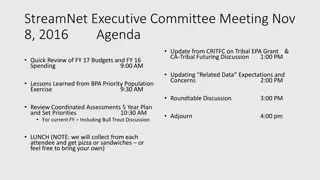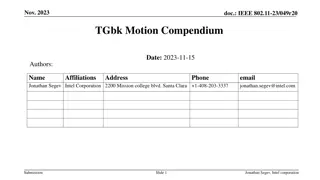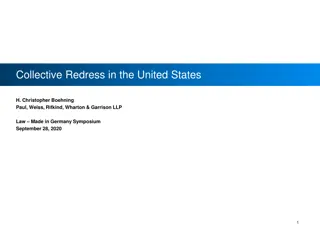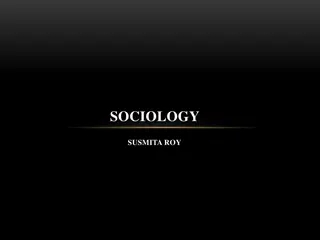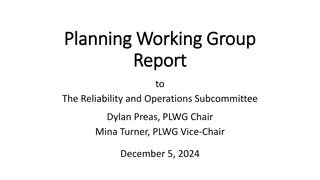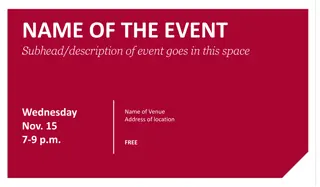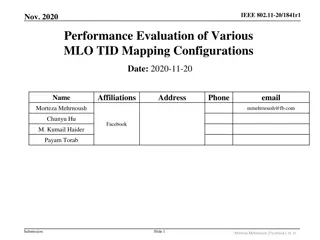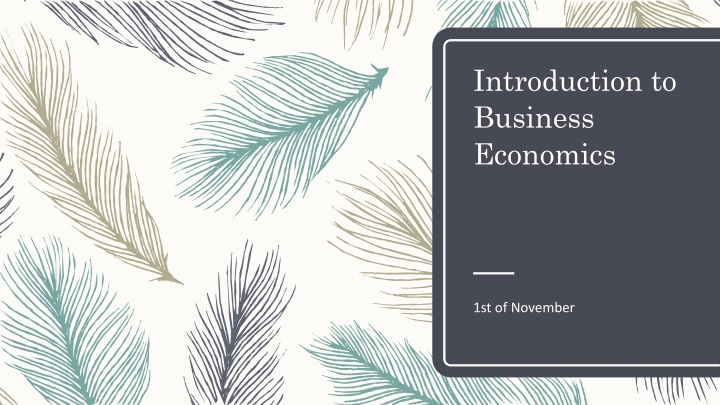
Business Economics Essentials: Scarcity, Consumption, and Production
Explore the fundamental concepts of business economics including scarcity, consumption, production, opportunity cost, and the role of economists in studying these economic phenomena. Learn about macroeconomics, microeconomics, and the vital principles of economics in this comprehensive guide.
Uploaded on | 0 Views
Download Presentation

Please find below an Image/Link to download the presentation.
The content on the website is provided AS IS for your information and personal use only. It may not be sold, licensed, or shared on other websites without obtaining consent from the author. If you encounter any issues during the download, it is possible that the publisher has removed the file from their server.
You are allowed to download the files provided on this website for personal or commercial use, subject to the condition that they are used lawfully. All files are the property of their respective owners.
The content on the website is provided AS IS for your information and personal use only. It may not be sold, licensed, or shared on other websites without obtaining consent from the author.
E N D
Presentation Transcript
Introduction to Business Economics 1st of November
Topics of this week What do economists study The problem with scarcity Consumption and production Branches of economics The circular flow of income Opportunity cost and rational choice 10 Principles of Economics
What do Economists Study? Tackling the problem of scarcity meaning of scarcity Scarcity is the excess of human wants over what can actually be produced. Example: resources, money Not every individual faces an equal problem of scarcity. Two key elements of satisfying wants: Production how much to produce Consumption how sensitive consumer demand is to change in prices Time is the scarcity, and it's the commodity we can't create any more of. Jim Mitchell
Ceteris paribus Is Latin for all other things held constant In constructive models, economists make assumptions to eliminate unnecessary details to reduce the complexity of behaviour.
What do Economists Study? Role of the business economist study of consumer behaviour study of firms factors of production human resources labour natural resources land and raw materials manufactured resources capital State of technology Business economists study the use of these resources by firms to meet consumer demand. Production therefore reduces the problem of scarcity related to consumption.
What do Economists Study? Demand and supply actual and potential demand and supply the role of firms in satisfying demand business economists study the role of firms in this process e.g., How they respond to demand How to produce input mix How much to produce majority of the firms are price taker
Dividing up the subject Dividing up the subject Macroeconomics Examines economy as a whole Concerned with aggregate demand and supply Key macroeconomic variables? Microeconomics Study individual units: e.g., households, firms and industries Interrelationships btw these units in determining the pattern of production and distribution of goods and services. Economics is extremely useful as a form of employment for economists. John Kenneth Galbraith
Q Which one of the following is a microeconomic issue? A. The government spends more than it receives in tax revenue. B. House prices rise more rapidly. C. Unemployment rises. D. The Bank of England raises interest rates. E. Imports exceed exports.
Q Macroeconomics is a branch of economics which examines A. the economic behaviour of aggregates income, employment, and output on a national scale. B. the functioning of individual industries and the behaviour of individual decision-making units, that is, business firms and households. C. ways to understand behaviour and the operation of systems without making judgements. D. outcomes of economic behaviour, evaluates them as good or bad, and prescribes preferred courses of action.
The Macroeconomic Environment Aggregate demand and supply Macroeconomic issues the objective of economic growth cyclical fluctuations in the economy recessions unemployment inflation balance of trade deficits Macroeconomic policy and business demand-side policy supply-side policy
Macroeconomic performance of four industrialised countries (average annual figures) Unemployment (% of workforce) Inflation (%) Economic growth (%) Balance on current account (% of national income) USA Jap Ger UK USA Jap Ger UK USA Jap Ger UK USA Jap Ger UK 1961 70 4.8 1.3 0.6 1.7 2.4 5.6 2.7 4.0 4.2 10.1 4.4 2.8 0.5 0.6 0.9 0.2 1971 80 6.4 1.8 2.2 3.8 7.0 8.8 5.2 13.4 3.2 4.4 2.9 2.0 0.9 0.5 1.1 0.7 1981 90 7.1 2.5 6.0 9.6 4.5 1.8 2.6 6.2 3.2 4.6 2.3 2.7 1.7 2.3 2.6 1.4 1991 00 5.6 3.3 7.8 7.9 2.2 0.5 1.8 3.2 3.4 1.2 2.1 2.5 1.6 2.5 0.7 1.5 2001 10 6.1 4.7 8.9 5.6 2.4 0.3 1.6 2.1 1.6 0.8 0.9 1.7 4.6 3.4 4.5 2.2 Source: based on data in European Economy (Commission of the European Union) 2011 13 8.0 4.4 5.3 8.7 2.4 0.2 2.2 3.0 2.2 0.9 2.1 0.8 4.3 3.1 5.8 2.2
Q Which one of the following is an example of demand-side policy? A. Building more roads so as to improve the efficiency of industry. B. Cutting corporation tax so as to encourage firms to reinvest more in R&D. C. Raising interest rates so as to reduce inflation. D. Curbing union power. E. Removing restrictions on imports in order to encourage greater competition.
Microeconomic Choices Microeconomics and choice What? How? For whom? Choice and opportunity cost Opportunity cost the cost of any activity measured in terms of best alternative forgone. Rational choices Weighting up the benefits of any activity against its opportunity cost
Factors that changed the world we live in Democracy The Limited Liability Company Patent Rights Literacy and Education. Education is the most powerful weapon which you can use to change the world. Nelson Mandela
Positive vs normative economics Positive economics Descriptive statements, claims how the world is. (Scientists) Normative economics Prescriptive statements claims how the world ought to be. (Policy Advisors)
Forces at play in the real world. Economic Supply and Demand Social Religion and Culture Political Governments.
10 Principles of 1 1 People Face Trade Offs People Face Trade Offs Economics Efficiency Getting the maximum benefit of scarce resources Equality Benefits are distributed equally amongst the population. A family is a risky venture, because the greater the love, the greater the loss... That's the trade-off. But I'll take it all. Brad Pitt
10 Principles of 2: the cost of something is what you gave up to get it. 2: the cost of something is what you gave up to get it. Economics Opportunity Cost The next best alternative that is given up when you choose something. In economics, one of the most important concepts is 'opportunity cost' - the idea that once you spend your money on something, you can't spend it again on something else. Malcolm Turnbull
10 Principles of 3: Rational people think on the margin. 3: Rational people think on the margin. Economics Rational people people who systematically and purposefully do the best they can do to achieve their objectives. Marginal changes small incremental adjustments to a plan of action. Marginal Benefit > Marginal Cost = decision will be made.
10 Principles of 4: People respond to incentives. Economics Incentive something that induces people to act. Unintended consequences. Call it what you will, incentives are what get people to work harder. Nikita Khrushchev
10 Principles of 5: Trade can make everyone better Economics Country X produces 10 apples and has $100 Country Y produces 10 oranges and has $100 Both apples and oranges cost $10 each Country X wants 3 oranges Country Y wants 7 apples. Everyone benefits with trade.
10 Principles of 6: Markets are usually a good way to organize economic activity. Economics Market economy Competitive market Command economy Soviet style economics Government decides what/how/to whom
10 Principles of 7: Governments can sometimes improve market outcomes. Economics Market failure a situation in which a market left to its own fails to allocate resources efficiently. Government's first duty is to protect the people, not run their lives. Ronald Reagan
10 8: a country s standard of living depends on its ability to produce goods and services. Principles of Economics Productivity: the quantity of goods and services produced by each output of labor. The only way to increase the standard of living is through increasing productivity. The productivity of work is not the responsibility of the worker but of the manager. Peter Drucker On my desk I have three screens, synchronized to form a single desktop. I can drag items from one screen to the next. Once you have that large display area, you'll never go back, because it has a direct impact on productivity. Bill Gates
10 Principles of 9: Prices rise when the government prints too much money. Economics Inflation: An increase in the overall levels of prices in the economy. Inflation is when you pay fifteen dollars for the ten-dollar haircut you used to get for five dollars when you had hair. Sam Ewing
10 10: society faces a short run trade off between unemployment and inflation. Principles of Economics Inflation occurs when the government prints money. When money is created there is a need to spend it which thereby increase demand. Higher demand means that firms can charge more, and in the short run encourages firms to higher more employees. More hiring = lower unemployment.






